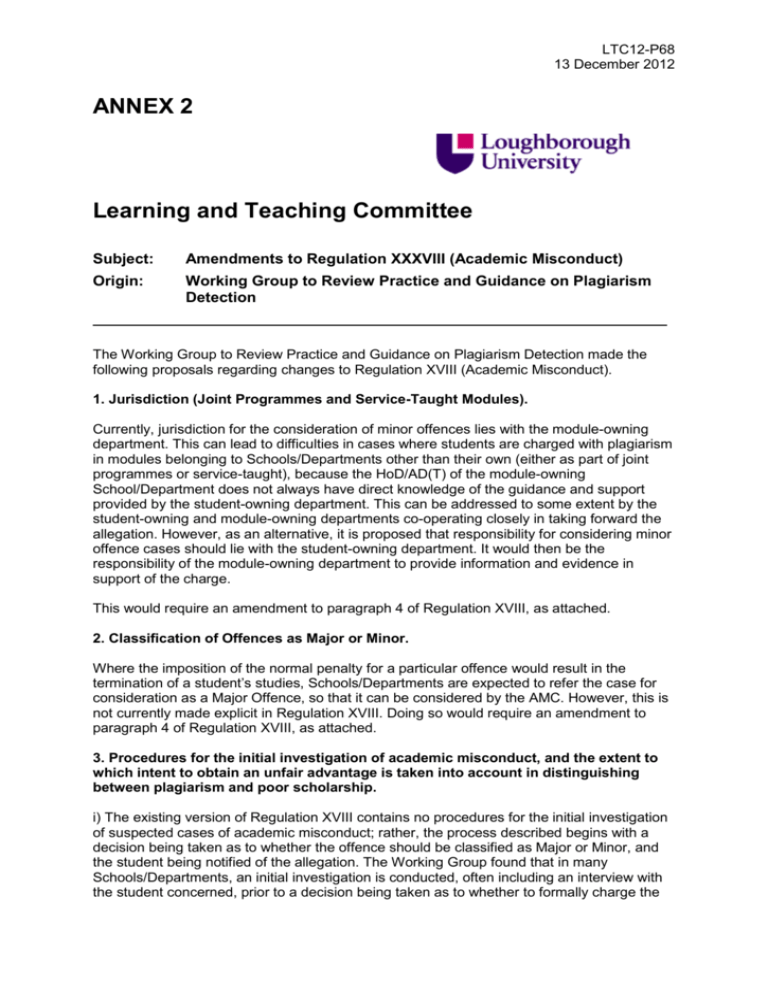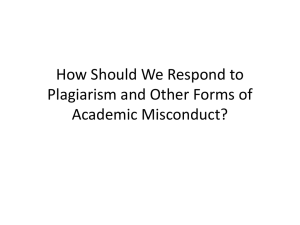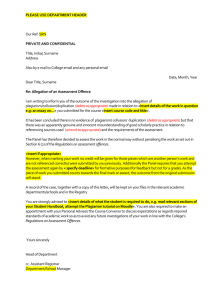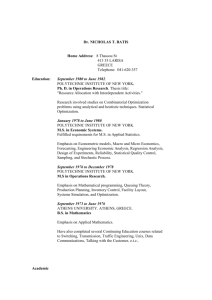
LTC12-P68
13 December 2012
ANNEX 2
Learning and Teaching Committee
Subject:
Amendments to Regulation XXXVIII (Academic Misconduct)
Origin:
Working Group to Review Practice and Guidance on Plagiarism
Detection
The Working Group to Review Practice and Guidance on Plagiarism Detection made the
following proposals regarding changes to Regulation XVIII (Academic Misconduct).
1. Jurisdiction (Joint Programmes and Service-Taught Modules).
Currently, jurisdiction for the consideration of minor offences lies with the module-owning
department. This can lead to difficulties in cases where students are charged with plagiarism
in modules belonging to Schools/Departments other than their own (either as part of joint
programmes or service-taught), because the HoD/AD(T) of the module-owning
School/Department does not always have direct knowledge of the guidance and support
provided by the student-owning department. This can be addressed to some extent by the
student-owning and module-owning departments co-operating closely in taking forward the
allegation. However, as an alternative, it is proposed that responsibility for considering minor
offence cases should lie with the student-owning department. It would then be the
responsibility of the module-owning department to provide information and evidence in
support of the charge.
This would require an amendment to paragraph 4 of Regulation XVIII, as attached.
2. Classification of Offences as Major or Minor.
Where the imposition of the normal penalty for a particular offence would result in the
termination of a student’s studies, Schools/Departments are expected to refer the case for
consideration as a Major Offence, so that it can be considered by the AMC. However, this is
not currently made explicit in Regulation XVIII. Doing so would require an amendment to
paragraph 4 of Regulation XVIII, as attached.
3. Procedures for the initial investigation of academic misconduct, and the extent to
which intent to obtain an unfair advantage is taken into account in distinguishing
between plagiarism and poor scholarship.
i) The existing version of Regulation XVIII contains no procedures for the initial investigation
of suspected cases of academic misconduct; rather, the process described begins with a
decision being taken as to whether the offence should be classified as Major or Minor, and
the student being notified of the allegation. The Working Group found that in many
Schools/Departments, an initial investigation is conducted, often including an interview with
the student concerned, prior to a decision being taken as to whether to formally charge the
student with academic misconduct.
In order to ensure consistency of practice, the Working Group proposed that Regulation
XVIII be amended to explicitly incorporate procedures for the initial investigation of
plagiarism cases, prior to a formal allegation being made.
ii) The Working Group also found a divergence between the existing procedures in
Regulation XVIII and the practices being followed by Schools/Departments in relation to the
extent to which intent to obtain an unfair advantage is taken into account in distinguishing
between plagiarism and poor scholarship. Under the terms of Regulation XVIII, academic
misconduct is a strict liability offence in that the definition in paragraph 2 does not refer to
whether the student intended to obtain an unfair advantage; intention should only be taken
into account at the stage of deciding on the appropriate penalty after the student has been
found guilty of an offence. However, responses from Schools/Departments indicated that in
practice, intent is taken into account, as part of an initial investigation, in distinguishing
between plagiarism (i.e. that which is dealt with as an offence of academic misconduct under
Regulation XVIII) and poor scholarship (i.e. that which is taken into account as part of the
assessment process but which is not treated as academic misconduct). Depending on the
findings of the initial investigation, either a formal allegation of academic misconduct is made
against the student, or the matter is dealt with as poor scholarship.
In order to ensure consistency of practice, the Working Group proposed that Regulation
XVIII be amended to state explicitly that following the initial investigation stage, a decision
will be reached about whether the case constitutes plagiarism (as opposed to poor
scholarship), and as part of this decision, account will be taken of a number of factors
including the extent to which the circumstances appear to indicate that the student intended
to obtain an unfair advantage (noting that intent is difficult to prove, but that information such
as the amount of improperly referenced material; any attempts at referencing within the
work; circumstantial evidence; and the student’s representations, can provide a helpful
insight).
Amendments to paragraphs 9 and 10 of Regulation XVIII, covering the above proposals are
attached.
Author – Chris Dunbobbin
Date – November 2012
Copyright © Loughborough University. All rights reserved.





